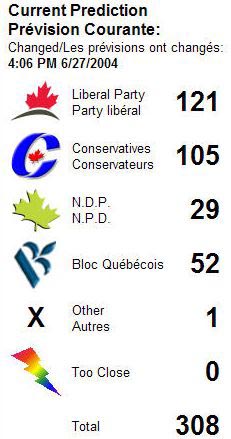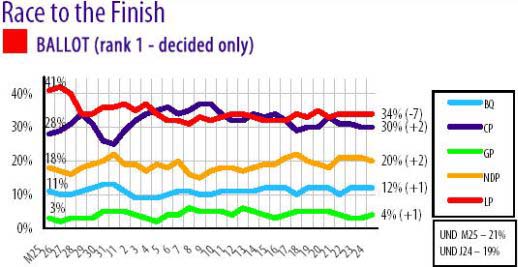
|

|
As part of VanRamblings’ Decision Canada review of key issues in the federal election campaign which cause us concern about the prospect of a Conservative government in Ottawa, in this second instalment of our series, VanRamblings reviews the Tory platform position on the arts, culture and Canadian heritage.
The Selling Off Of Cultural Identity In A Free-Market Economy
As Margaret Atwood wrote in a June 9th piece for the Globe and Mail, culture hasn’t exactly grabbed the spotlight in this election campaign. But considering that, according to Statistics Canada, there are 740,000 direct jobs in the cultural sector — more than in forestry, agriculture, and mining combined — and given that cultural activities generated $26-billion of Canada’s Gross Domestic Product in 2001, and exported $2.88-billion worth of it in 2000, the dearth of coverage of culture and the arts in the current federal election campaign is a disservice to all Canadians.
Considering the indirect jobs and the revenue generated by cultural activities — the spinoffs generated in the travel industry, hotels and bed-and-breakfasts, in restaurants and in small businesses — and the thousands of unpaid volunteers who work in this area for the satisfaction of it and to help their towns or cities, and factoring in the audience — the listeners, the viewers, the readers — any reasonable person will soon come to realize the impact the arts has on the lives Canadians is immense.
The position of the ‘new’ Conservatives on culture? The Tories are the one national federal party that would kill the CBC, eliminate the CRTC, abolish the Canada Council and take away all funding to Heritage Canada, theatre, film, dance, multicultural agencies and each and every arts organization that currently receives some form of federal subsidy. Those monies (and a great many more of our tax dollars) would instead be re-directed towards the build-up of a wartime-equipped and ready Canadian military.
In her June 9th Globe and Mail and article, Ms. Atwood writes …
“A long time ago, the party best on Culture was the now-defunct Progressive Conservative Party. Under the old Tories we were given Flora MacDonald, no slouch, and Marcel Masse, the best culturecrat we ever had.
However, things have changed radically. Those calling themselves the Conservatives are really the Body Snatchers. They’ve eaten the comfy old Tories … and now they’re prowling the earth with destruction in their hearts. When these neo-Cons hear the word Culture, they reach for their nugs. (Guns turn into nugs when you pretend you didn’t want Canada to join in the invasion of Iraq, although you did, too, want it). Be very afraid!
What the Social-Credit-Alliance-Reformers-in-Conservative-clothing say is that they have nothing against Culture as long as they don’t pay a nickel toward it. They don’t mention the whacking great benefits the public gets back. Instead, they say, ‘Let cultural items compete on their own merits in the marketplace.’ These neo-Conservatives are not pragmatists, they’re ideologues, and ideologues will ignore any fact that doesn’t fit their worldview.”
The percentage of Canadians who attend cultural events and festivals exceeds 70 per cent, yet the arts and culture — for the most part — has emerged as a non-issue in this election campaign.
As VanRamblings wrote in an earlier posting, for many of us one of the most distressing aspects of the election campaign occurs in consideration of what a Tory government would mean to the arts in Canada.
According to Guy Mason, president of the Canadian Film and Television Production Association, Conservative cultural polices would gut film and television production in Canada.
“What we’re seeing could be a devastation of the industry in a free and open market in North America,” says Mason. “Who’s going to be creating Canadian content?”
In their pre-election report, the Canadian Conference of the Arts (CCA) gave the Conservatives a C- (by far, the lowest ranking among the five major parties), for “no sign of support for the arts.”
In an article published written by award-winning writer and journalist Todd Babiak for the Edmonton Journal, Mr. Babiak writes …
In its 46-page policy platform, the Conservative Party doesn’t mention art and culture. Not even in the appendix. The word art only appears once, in quotations, decrying the “artistic licence” defence for child pornographers. Stephen Harper and other Conservatives have said they would cut finding to the CBC in whole or in part, and Heritage critic Jim Abbott supports lifting foreign ownership restrictions on telecom companies and broadcasters.
Babiak concludes his article, by writing, “In all our current excitement about change, we should notice what the parties ignore. We may not know what we’re voting to abandon until it’s gone.”
In respect (or lack thereof) of the CBC, Ontario Tory hopeful Joe Spina, a two-term MPP under Mike Harris and Ernie Eves, stated he wants funding for the CBC switched off, calling it the Communist Broadcasting Corporation and saying it serves as a mouthpiece for the federal Liberals.
Repeated polls have shown Canadians strongly approve of the mandate for the broadcaster, which receives approximately $1 billion in annual government funding to operate in both English and French.
The Culture War: Election 2004’s Unreported Issue
Ian King, writing in this week’s Terminal City, discusses the possible impact of a Conservative Party win and how a Tory government would deal with the arts, the entertainment business, and the media.
“Of course, funding for the Canadian Television Fund, FACTOR, the Canada Council, the Canadian Magazine Fund, and the myriad other cultural granting programmes aren’t the only government supports for Canada’s cultural industries. There are restrictions on foreign ownership of broadcasters and newspapers and CRTC rules that give Canadian TV channels first priority on cable and satellite systems, but also force broadcasters to air Canadian programming to get that unfair advantage. None of this regulatory regime impresses the Conservatives much.
The Conservatives have made no firm commitment to protecting any of those programmes or regulations. With budget crunches likely to come in a Conservative regime, and with most of the existing caucus unenthusiastic about existing granting programmes, expect cultural funding to shrink.
If you like your CBC, fear the Tories. The Conservatives’ antipathy towards the CBC is legendary — partisans still mope about MotherCorp’s look at Stockwell Day’s religious beliefs back in 2000, believing somehow that that documentary, as opposed to a blundering leader and party, cost the Alliance the election. Alliance Heritage critic Jim Abbott summed up his party’s feelings in 2002, when he told the National Post (itself legendary for self-interested CBC-bashing), “It’s a sincere question. Why do we need [the CBC]? Why should we have it?”
Ian concludes his piece by writing, “The next government could seriously change how Canadian arts and culture operate, and the changes could be dead ugly if we make the wrong choices. Do you really want to risk it by not having your say on Monday?”
Ian King is the administrator of the weblog The Vancouver Scrum.
ACTRA: Conservatives Mum On Culture
In a story published in the Toronto Star, the paper reports that ACTRA, the actors’ union, says the response from the Conservatives to its list of culture-industry priority questions has been … silence.
There are three major issues for ACTRA: keeping limits on foreign ownership of Canadian airwaves; reviewing CRTC policy to reinstate Canadian content requirements on Canadian broadcasters; and changing federal tax laws so performers can make a living in this country.
The union’s pleased with responses from the NDP, Bloc and Green party, who “took strong positions against permitting more foreign ownership…” says national executive director Stephen Waddell. The Liberals gave “some positive responses,” but didn’t adequately address foreign-ownership concerns.
The Conservative party, he says, did not respond at all.
No Tory Defence for Artistic Merit
Mark Leiren-Young, at The Tyee.ca, offers analysis of the Tory’s scorched earth policy toward Canadian culture, in an article published June 24th.
Covering much the same territory explored by VanRamblings and Ian King, above, Mr. Leiren-Young provides information on “Tory plans to neuter the CRTC, relax foreign ownership regulations and deregulate the airwaves”, as well as rescind tax breaks for the film and TV industry, which North Vancouver Tory MP Ted White referred to as “corporate welfare”; a Conservative government would eliminate this subsidy, Mr. White said.
Although “arts and cultural communities might have a raft of grievances against Paul Martin’s Liberals … the Tories could be a bigger threat to Canadian culture than free trade,” writes Mr. Leiren-Young, as a précis response to a conversation he had with Clem Martini, president of the Playwright’s Guild of Canada. The full Tyee.ca article is available here.
Canada’s Heritage At Risk
According to Liberal Heritage Minister Hélène Scherrer, a Conservative government would eviscerate Canadian culture by ending its fundamental protections and leaving control of the airwaves to the likes of global media baron Rupert Murdoch. The Conservatives’ market-driven policy would allow unfettered foreign competition, encouraging multinational corporations to purchase Canadian radio and television networks.
Government support, including government support by previous Progressive Conservative regimes — whether through funding or protectionist laws — have succeeded in building a homegrown cultural industry where one barely existed decades ago, creating a situation today where Canada is one of the world’s largest exporters of cultural products.
But the so-called free-market philosophy of Stephen Harper’s Conservative Party is one where the marketplace — and only the marketplace — rules, no matter the industry. Ask yourself: Is a Canada bereft of a proud Canadian cultural identity, a Canada we would wish to bequeath to our children?




